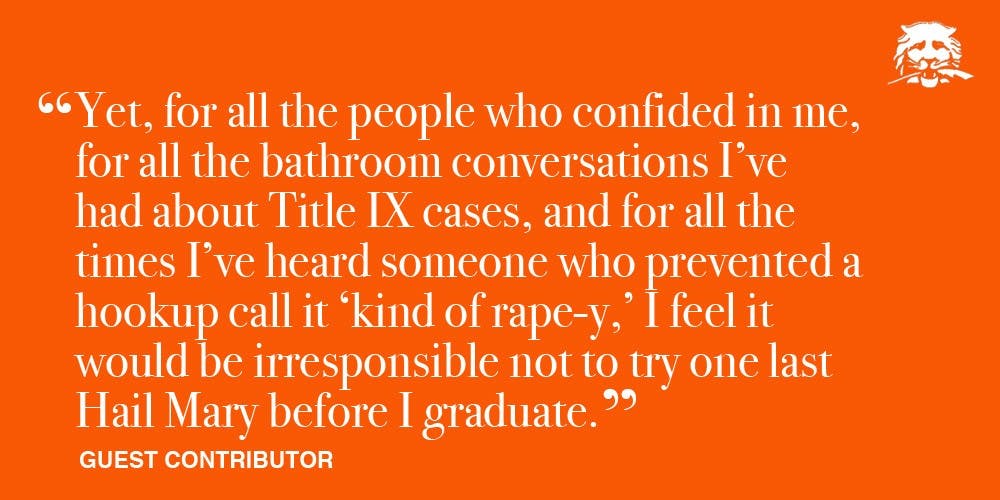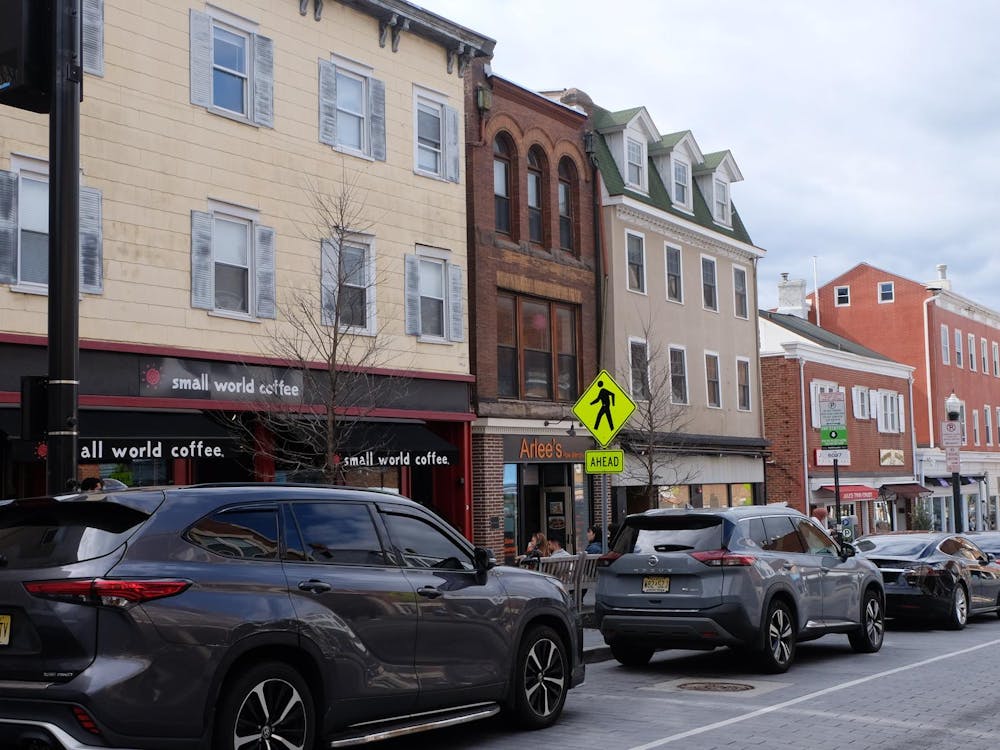The first time I met the Class of 2019, I was Anna in the SHARE play. I met the Class of 2020 the following year, as a director. A funny thing happened to me when I did that. When I told people, “I’m directing the SHARE play,” more often than not, they would tell me their opinions about misconduct on campus. Sometimes, people would share a personal story. I learned that lots of people don’t know the University’s definition of sexual misconduct. I learned that many people, more than I originally thought, have dealt with misconduct, but would never dream of talking to the University’s Title IX committee and couldn’t handle the stress of an investigation. Moreover, I learned that people don’t talk so much about misconduct after freshman year. One RCA went so far as to say that juniors needed to see the SHARE play again — that they were the ones who needed it.
With all this in mind, I became an eating club officer. Aside from my direct responsibilities, I wanted to do only one thing: Change my club’s sexual misconduct policies. There were office hours. I spent roughly six hours a week talking about sexual misconduct during April 2017. I spoke to students and SHARE administrators, officers and non-officers, to people with whom I agreed and disagreed. I have been told things I have promised never to share with others. I changed my mind a huge number of times. At the end of all this listening, I tried to advocate for change. In retrospect, I think I was trying to be a vessel for the opinions of others. I’m sure many students’ Princeton experiences evade discussions of sexual misconduct. Mine has been drenched in them.
The next thing I learned was a lesson of perspective: No matter how many people you try to represent or advocate for, you will never be more than one person. Looking at you, someone doesn’t see how many different opinions you’ve heard and weighed; they see one person, one opinion, one vote. Individuals cannot make change alone; groups make change. I changed almost nothing. Everyone’s time was wasted.
Fast forward to this spring. I am not an officer anymore. A junior is complaining about something. He doesn’t like something our eating club does. I listen, and explain how I think that thing could be changed. He responds, “I would be so happy for you to change that. Let me know if I can help.”
I am leaving Princeton with lower tolerance for those who complain about something they can change and then do nothing. I cannot be a vessel for the opinions of others anymore. It is ineffective. Moreover, I am a senior. I am leaving. I am not an officer. I am exhausted. Yet, for all the people who confided in me, for all the bathroom conversations I’ve had about Title IX cases, and for all the times I’ve heard someone who prevented a hookup call it “kind of rape-y,” I feel it would be irresponsible not to try one last Hail Mary before I graduate.
This is it. I turn to you. I am only one; you could be many.
Many of Princeton’s eating clubs need to have real, meaningful conversations about their sexual misconduct policies. I’m sure some of the clubs have passed down complete and well thought-out policies. I am also sure that many have not. Perhaps you are in an eating club whose only formal policy is the Interclub Council’s.
The ICC policy reads: “Sex and gender-based discrimination and sexual misconduct, including sexual harassment, (as defined under ‘Rights, Rules, Responsibilities’) are prohibited on or about all Club premises…. Members shall endeavor to ensure that the Club maintains an atmosphere free of any pressures on other members, guests and employees relating to sexual misconduct.”

Here are many questions that the ICC guidelines do not answer:
What kind of documentation should be passed down through eating club officer corps and memberships related to misconduct? Should sexual misconduct be treated differently than other disciplinary problems, like violence or destruction of property? How should eating club officers handle a sexual misconduct complaint from one member about another member? What if the complaint was about an officer? What about from a member about a nonmember? How much investigatory responsibility should an officer corps take on related to these complaints? Are eating club officers responsible for enforcing university no-contact orders? Which kinds? What about no-contact orders related to Title IX investigations? If you are a Bicker club, how best should your Bicker process handle sexual misconduct? Should your club care about the results of Title IX investigations if the investigation was about one of your members? Or an officer? With which verdicts? What are your responsibilities if you witness misconduct, or more specifically assault, in your club’s building between nonmembers? (P.S. Do you know the University’s definition of sexual misconduct?)
If you are an eating club member: Do you know your club’s answers to these questions? Does it matter to you? You are paying dues, after all. Misconduct is a disciplinary problem, and thus one of the University’s responsibilities, but more than that it is a cultural problem. How our most prominent social institutions handle sexual misconduct says volumes about how we, the students, tolerate and normalize misconduct in our own communities. Can you say you are proud of the culture that you have supported?
If you are an officer: Your corps should have answers to these questions. Perhaps you will never deal with a Title IX conflict, or a no-contact order, or any of the other conflicts alluded to above during your time as an officer. I can promise you that there have been officers before you that have not been so lucky. You are in a position to alter the culture of the communities that many Princetonians call home. Think critically, listen often, and thank you for your time.

I write not to tell you what to think, just that you should think. Members, talk to your officers, and officers, talk to your grad boards. One prescription will not fit all. Additionally, I am not targeting any single club. Too many in my own circle scapegoat clubs like Tiger Inn and Cottage Club to absolve their own. Sexual misconduct does not limit itself to one club, and does not exist only in the stereotyped pockets of this campus. Misconduct is a campus-wide issue. Perhaps it is time for our most famous social institutions to start treating it like one.
Alex Vogelsang is a senior in the Department of Computer Science. She can be reached at aav5@princeton.edu.








